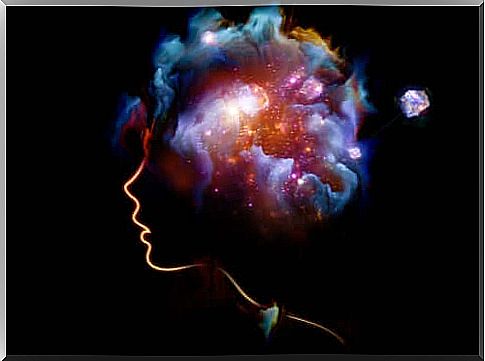The Most Common Cognitive Distortions Of Anxiety

The most common cognitive distortions of anxiety are a mechanism with one clear goal: to increase our suffering. The mind is trapped in patterns of rigid and negative thoughts that act like a trap or a quicksand where reason, logic, and inner balance sink beyond our reach. The world is becoming threatening and every problem – no matter how small – no longer has a solution.
While such psychological dynamics are characteristic of disorders such as anxiety or depression, it should be noted that we all take advantage of cognitive distortions at some point in our lives. While some to a lesser extent and others to a greater extent, for example, we have all applied an emotional reasoning that leads to thoughts such as, “ if right now I feel clumsy and incompetent, it is because I am incompetent ”.
But even though our minds have handled things wrong and in a way that is detrimental to ourselves, we usually keep ourselves in control. When we analyze reality more calmly, we end up taking advantage of slightly more realistic (and friendlier) attitudes.
Indeed, problems arise when we are unable to do this, when our feelings do not follow us, when external difficulties are very complex, and when our psychological resources are minimal. Under these conditions, it is easy to end up feeding negative distortions.
The best strategy we can learn is to identify these cognitive distortions, understand how they work, and take power away from them. When we do this, our well-being will notice it.

The most common cognitive distortions of anxiety
“ I can’t stand this, it’s unbearable, I’m going crazy,” “I’m worthless,” “the only thing I can expect now is that everything is going to get worse – I can’t do anything about it. “Such reasoning creates a mental fog in our minds where only anxiety and destruction can breathe. If such approaches are constantly strengthened, mental exhaustion will be enormous.
Cognitive distortions are basically traps to the brain, they are systematic ways in which people twist information about the environment; what happens to us and what we see. If we ask ourselves why we use such mechanisms, the answer is more complicated than it initially seems. Sometimes it is because of the feedback we have between our own feelings and thoughts.
“I feel bad and that’s why I think about negative things, so those thoughts feed my bad feeling even more.” Sometimes cognitive distortions are systems that we have almost always used without even realizing it. Complex childhood or caregivers with little affection can often cause us to tend to interpret things in a spiritually consuming way. In addition, if our self-esteem is low, it is easy for us to fall into such spiritual traps.
For this reason, we turn our attention next to those cognitive distortions that are most common in anxiety.
A catastrophic way of thinking
Wait for the worst so you can prepare for it. We assume this is a good strategy, but in fact, through this mindset, we are only increasing our own anxiety. “If I can’t get through this exam, I already know I won’t finish my studies, so it’s best to start assuming I’m worthless” or “given what’s going on, it’s clear things will only get worse and no one will have a job soon” are examples from this very common cognitive distortion.
Diatomic or polarized thinking
All reasoning that begins with the terms “always,” “never,” “all,” or “nothing,” applies a polarized mindset. This way of thinking includes all ways of dealing with a reality where “ everything is good or bad ” where “ you are either with me or against me ” or “ I get what I want or I fail because I am useless ”.
This kind of thinking is one form of guilty suffering.

Selective abstraction
Sometimes our attention has an unusual and perverted tendency: to see the negative side of life in every situation. Selective abstraction is one of the most common cognitive distortions of anxiety. It happens when we are left alone with the darkest side of reality; when we always interpret things from the most harmful side.
An example of such a mindset would be: “ I have invited everyone from the office to my birthday and Karoliina is the only one who has not come. I’m sure he hates me and the others are here just because they feel obligated to come. ”
Personalization
“If my boss is arguing with someone in the office, it’s because of something I’ve done.” “If the cashier treats me rudely, it’s because no one ever likes me.” “The project I presented today at work has been a disaster, and that’s why everything is going to go just as badly, because I’m not worth anything.” Such reasoning is the result of this negative internal dialogue in which we personify all the facts we see around us. As if everything was our responsibility or our fault.
Arbitrary reasoning, internal bad guesses
Anxiety has a certain tendency: it makes us believe that we are like the oracle of Delphi. In other words, we take on the role of a forecaster so that we can predict certain situations. The most common examples of this way of thinking are:
- We think we know what others think of us. Often even so much that our minds torture us with thoughts like, “ I’m sure he considers me a loser, he doesn’t like me, he feels sorry… ”
- It is also common to fall into the mistake of “predicting the future” by telling ourselves how “ I will fail, I will interrupt, he will tell me no, everything will go wrong…”
In summary, we can say that by recognizing the most common cognitive distortions of anxiety, it can offer us two things. The first is to observe these mindsets that feed a bad feeling. One of them is to understand how the human mind works, and that if we don’t control it and set boundaries, it can become our worst enemy.
For this reason, we should learn to take care of it and see it as a garden where only those thoughts that help us motivate ourselves and that make us feel valued get the opportunity to grow and bloom there freely.









